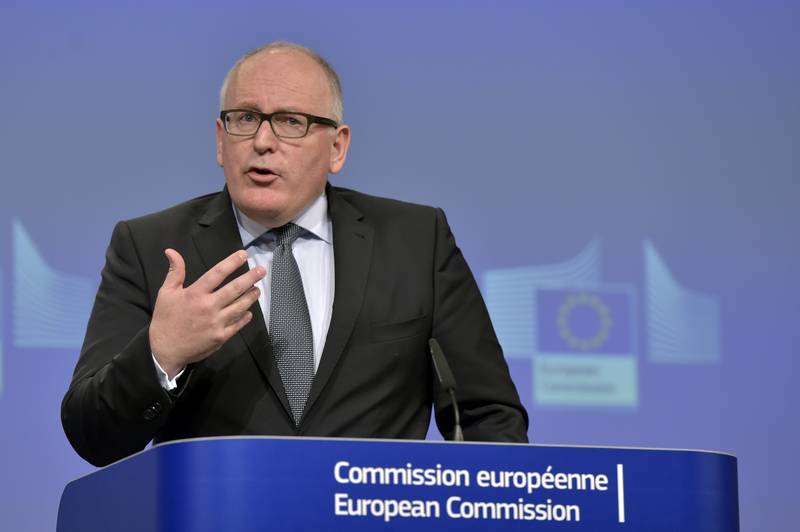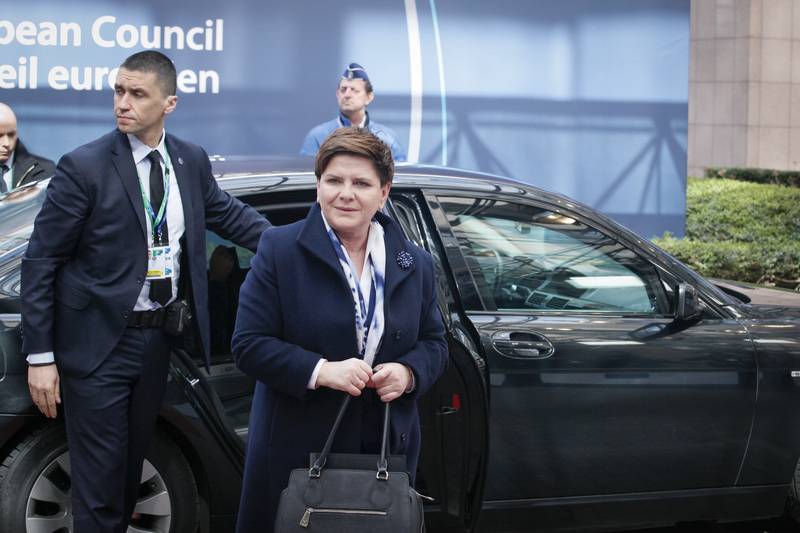Commission Struck a Snag With Poland
Adelina Marini, June 2, 2016
 Poland is not moved the least bit by the European Commission’s attempts to explain to Warsaw that it has commitments to the rule of law, stemming from Article 2 of the Treaty of the EU. Ever since January, when the EC officially started a procedure against Poland due to concerns that the rule of law is seriously endangered in this member state, there has been no improvement. EC First Vice President Frans Timmermans (The Netherlands, Socialists and Democrats) visited Warsaw on several occasions in an attempt to persuade local authorities that what they are doing with the Constitutional Tribunal does not fit in the European view of rule of law, but to no avail. The eurosceptic government of the Law and Justice party is convinced that it is within its right and does not wish for European intrusion, even threatens the EC with lawsuits because of breach of treaties.
Poland is not moved the least bit by the European Commission’s attempts to explain to Warsaw that it has commitments to the rule of law, stemming from Article 2 of the Treaty of the EU. Ever since January, when the EC officially started a procedure against Poland due to concerns that the rule of law is seriously endangered in this member state, there has been no improvement. EC First Vice President Frans Timmermans (The Netherlands, Socialists and Democrats) visited Warsaw on several occasions in an attempt to persuade local authorities that what they are doing with the Constitutional Tribunal does not fit in the European view of rule of law, but to no avail. The eurosceptic government of the Law and Justice party is convinced that it is within its right and does not wish for European intrusion, even threatens the EC with lawsuits because of breach of treaties.
The Commission was supposed two weeks ago to send to Poland its opinion on the state of rule of law, which is one of the steps along the toothless procedure, but decided to give Poland more time. Again with no success. After Wednesday's meeting of the College of Commissioners of the EC, the opinion was sent. Its contents are unknown, for at this stage of the procedure they are not made public, but it becomes clear from Mr Timmermans’ words that it is not positive. The EC continues to be concerned by the problems with appointing judges to the Constitutional Tribunal and the implementation of the Court’s rulings from December 3rd and 9th. Also problematic is the tribunal's ruling of March 9th of this year, as well as the tribunal's effect on new legislation, adopted this year.
Polish authorities have two weeks to react to the opinion. If the EC’s concerns are not taken into account, the next step is the EC issuing a recommendation what needs to be done. If still there is no result, the triggering of the so called “nuclear bomb” follows – Article 7, which provides for suspending the right of vote of the member state. Getting to this last action, however, requires the approval of the member states. According to Politico Europe, Poland is far from isolated in the Council, it has the support of Eastern European members. Moreover, Poland was not a subject of discussion during the regular annual dialogue on the rule of law, which was held last week on May 24th. This dialogue in the General Affairs Council is a part of the so called rule of law mechanism, but the Dutch presidency decided to organise it with a different focus – respect for fundamental rights and the rule of law in the context of integration of refugees and migrants.
After the General Affairs Council meeting, Dutch Foreign Minister Bert Koenders stated that there is no reason to avoid talking about a country like Poland, but for the moment it is the European Commission that is dealing with this issue. “I will have to await for these conclusions”, were Koenders’ words at the press conference after the meeting. There was an expected reaction to the EC’s opinion in Poland. Minister of Justice Zbigniew Ziobro stated that he is surprised and saddened. Frans Timmermans underlined several times that the EC is still in the dialogue phase and that it is constructive. It did not become clear what does constructive dialogue mean, having in mind the lack of any progress.
The author of the idea of creating a powerful mechanism for the rule of law, Viviane Reding, former Commissioner from Luxembourg, now MEP from the EPP group, stated that the EC’s decision was necessary, although saddening. “As the Polish government continues its authoritarian drift, the Guardian of the European Treaties takes its responsibility” feels Ms Reding, whose idea of a common European mechanism for the protection of the rule of law, inspired by the Cooperation and Verification Mechanism, under which Bulgaria and Romania were accepted in the European Union, was trimmed beyond recognition by member states. This happened at the end of a period when Hungary was the only one to make such type of trouble for the EU. Nowadays, the eurosceptic and authoritarian governments in the Eastern part of the EU are more. Without a working mechanism they will become even more.
 At the moment, the European Parliament is working on a new idea for enhancing the rule of law mechanism, whose author is the liberal MEP Sophia in 't Veld (The Netherlands). Last year she proposed a pact for democracy and rule of law, which requires that the EC comes up by the end of this year with a new proposal for an inter-institutional agreement, which would ease the work of institutions and access to Article 7. She proposes that Article 2 of the main EU treaty turns into legal ground for starting infringement procedures, with national courts and even individual citizens being able to start lawsuits in the Court of the EU when there are doubts about the law in a member state. Inside the MEP’s proposal there are clear indicators given for democracy and rule of law.
At the moment, the European Parliament is working on a new idea for enhancing the rule of law mechanism, whose author is the liberal MEP Sophia in 't Veld (The Netherlands). Last year she proposed a pact for democracy and rule of law, which requires that the EC comes up by the end of this year with a new proposal for an inter-institutional agreement, which would ease the work of institutions and access to Article 7. She proposes that Article 2 of the main EU treaty turns into legal ground for starting infringement procedures, with national courts and even individual citizens being able to start lawsuits in the Court of the EU when there are doubts about the law in a member state. Inside the MEP’s proposal there are clear indicators given for democracy and rule of law.
Democracy indicators include the separation of powers, the impartial nature of the state, the reversibility of political decisions after elections, the existence of institutional checks and balances, the permanence of the state, freedom and pluralism of the media, integrity and absence of corruption, transparency and accountability, a charter of fundamental rights. Rule of law indicators are legal certainty, prevention of abuse of power, equality before the law and non-discrimination, access to justice (independence and impartiality, fair trial, constitutional justice). Challenging the rule of law are corruption, conflict of interest, collection of personal data and surveillance. Sophia in 't Veld’s report is still in the process of amendments. The deadline for collecting them expires on June 17th.
Even if it is approved by the European Parliament in this form, it will hardly go any further, for it is obvious that there is no will among the member states for upholding European values when there are geopolitical problems at the front line. Poland is an important state to the EU, first of all because of its size and, secondly, because of its firm position towards Russia. Should the EU back down because of geopolitical reasons, however, it will mark the beginning of the end for it.
Translated by Stanimir Stoev
 Entrance to the Berlaymont building | © EC - Audiovisual Service
Entrance to the Berlaymont building | © EC - Audiovisual Service | © European Union 2020, EC - Audiovisual Service
| © European Union 2020, EC - Audiovisual Service Commission President Ursula von der Leyen | © European Union 2019 - Source: EP
Commission President Ursula von der Leyen | © European Union 2019 - Source: EP